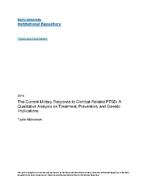|
|

Notes
- Abstract:
- Combat-related post-traumatic stress disorder (PTSD) is a recognizable psychological concern within our military. The lifetime prevalence of combat-related PTSD within the population of the United States veterans ranges from 6-31%. Therefore, out of the 21.2 million veterans in the United States military, 1.3 to 6.6 million are expected to experience PTSD in their lifetimes. The military has taken action towards addressing the increase of combat-related PTSD cases with various treatment options, preventative measures, and newly identified genetic research. The most efficacious treatment options include selective serotonin reuptake inhibitors, prolonged exposure therapy, cognitive behavioral therapy, as well as eye movement desensitization and reprocessing. Preventative measures include pharmaceutical interventions that interfere with memory consolidation, resilience training, and psychological debriefing programs such as Battlemind that help soldiers cope with trauma and ease their transition back to noncombat life. The possible genetic implicates are still in the early stages of research but many genes have been implicated with the disorder such as FKBP5 and 5HTT/5HTTLPR. The Department of Defense plans to launch a Million Veterans Program that will take genetic information from one million veterans in order to discern a genetic predisposition profile. This information will be used to help provide better understanding of PTSD development and treatment. There may be alternative military uses for this genetic information that are not known yet. Overall, combat-related PTSD is under researched and more in-depth studies need to be done in order to accurately assess the United States’ approach towards combat-related PTSD.
- Thesis:
- Thesis (Honors)--Barry University, 2016.
- Bibliography:
- Includes bibliographical references (leaves 38-43).
Record Information
- Source Institution:
- Barry University
- Holding Location:
- Barry University Archives and Special Collections
- Rights Management:
- Copyright Tayler Malinowski. Permission granted to Barry University to digitize, archive and distribute this item for non-profit research and educational purposes. Any reuse of this item in excess of fair use or other copyright exemptions requires permission of the copyright holder.
- Resource Identifier:
- RC552.P67 M355 2016_MalinowskiTaylor ( BU-Local )
- Classification:
- RC552.P67 M355 2016 ( lcc )
|
|